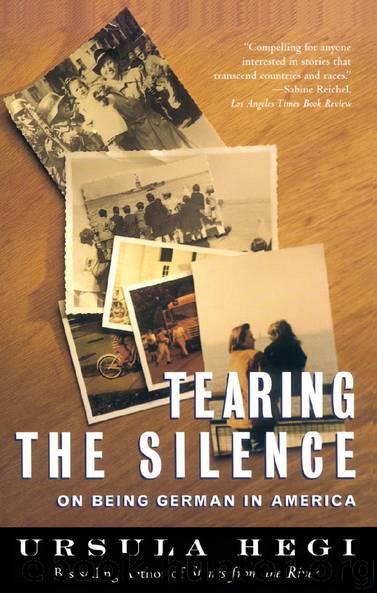Tearing the Silence by Ursula Hegi

Author:Ursula Hegi
Language: eng
Format: epub
Publisher: Simon & Schuster
Published: 1997-07-15T00:00:00+00:00
Joachim
Born: 1947
Age at time of immigration: 9
During Hitler’s Time You Would Have Been Shot for That
I just saw this film, Europa Europa. This boy was denying that he was Jewish. Look at all the people who denied that they were homosexual. I would have denied it. I have to be honest with you. Because I did deny it. Look, I denied it all these years, and ja, I consider myself fortunate that I can get away with it. I’ve heard the talk about people who are gay. Even the Jews discriminate against us.
I’m sure people at work know, but I don’t talk to them about that part of my life. Every once in a while my bosses will drop hints. They’ll say they didn’t know their son’s friend was gay, and that now he’s dying of AIDS. I listen, but I won’t get involved in the discussions. Twice in my life I lost people because I told them. The weight of the secret is that you’re never entirely yourself in an environment where others are not the same as you.
I’m the county manager of a small community in Missouri. County managers handle day-to-day affairs of towns, such as police and public works and streets and parks and zoning and building. I like my work. Where else but in America could somebody immigrate and in a short time be a political leader? When I came to this town, it didn’t have a lot of things. I had a vision, but I was only the orchestra leader, because it took the whole band to put this together. We built a new township building, expanded our facilities, and put our infrastructure in order, which included streets and sewers. People like this community because of the stability. Of course, everybody’s saying: “That’s because we have this good, strong German manager.” They think that’s all German orderliness and Gründlichkeit —thoroughness. I say: “That’s a lot of baloney. It has nothing to do with Germany. It has to do with discipline.” When people attach “ German ” to “clean and orderly,” those traits come across as negative to me, and I feel a little strange.
I would like to create a better—or different—image of Germany than what people generally have. Those darker years from the 1930s to the 1940s don’t reflect everyone in Germany. We’re human beings like everybody else: we have the same feelings, the same strengths, the same weaknesses, the same aspirations, I want people to see us as human beings—not as the monsters that are evoked to this day in the news media and in the thoughts of people when they hear “Germany.”
I try to understand what happened in Germany, why it happened, and how it could have happened. Unbelievable atrocities were committed. I agree with those who say: “Never again.” We cannot help but feel ashamed for what happened in Germany, but I do not think people have a right to make us feel ashamed—those of us who were born after the war. I look at the pictures of my nieces and nephews.
Download
This site does not store any files on its server. We only index and link to content provided by other sites. Please contact the content providers to delete copyright contents if any and email us, we'll remove relevant links or contents immediately.
| African-American Studies | Asian American Studies |
| Disabled | Ethnic Studies |
| Hispanic American Studies | LGBT |
| Minority Studies | Native American Studies |
Cecilia; Or, Memoirs of an Heiress — Volume 1 by Fanny Burney(32558)
The Great Music City by Andrea Baker(32019)
Cecilia; Or, Memoirs of an Heiress — Volume 2 by Fanny Burney(31956)
Cecilia; Or, Memoirs of an Heiress — Volume 3 by Fanny Burney(31942)
We're Going to Need More Wine by Gabrielle Union(19046)
All the Missing Girls by Megan Miranda(16029)
Pimp by Iceberg Slim(14508)
For the Love of Europe by Rick Steves(14121)
Bombshells: Glamour Girls of a Lifetime by Sullivan Steve(14076)
Talking to Strangers by Malcolm Gladwell(13370)
Norse Mythology by Gaiman Neil(13366)
Fifty Shades Freed by E L James(13243)
Mindhunter: Inside the FBI's Elite Serial Crime Unit by John E. Douglas & Mark Olshaker(9343)
Crazy Rich Asians by Kevin Kwan(9292)
The Lost Art of Listening by Michael P. Nichols(7506)
Enlightenment Now: The Case for Reason, Science, Humanism, and Progress by Steven Pinker(7314)
The Four Agreements by Don Miguel Ruiz(6765)
Bad Blood by John Carreyrou(6622)
Weapons of Math Destruction by Cathy O'Neil(6281)
